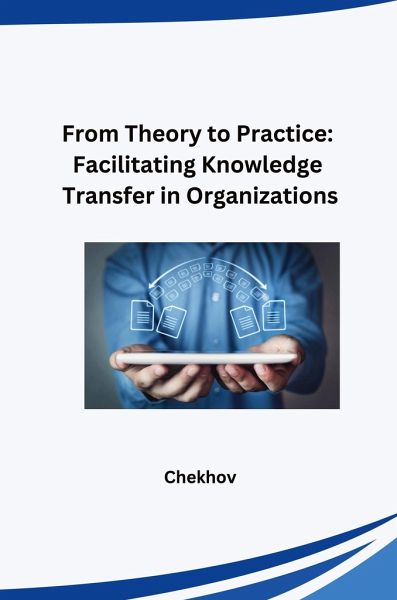
From Theory to Practice: Facilitating Knowledge Transfer in Organizations
Versandkostenfrei!
Versandfertig in 6-10 Tagen
31,89 €
inkl. MwSt.

PAYBACK Punkte
0 °P sammeln!
This title offers a few advantages:-Intrigue: "Bridging the Gap" sparks curiosity about the challenges of knowledge transfer.-Clarity: "Knowledge Transfer" clarifies the core topic.-Action-Oriented: "Turning into Action" emphasizes the practical aspects.The piece could delve into the gap between knowledge and application:-Theoretical Knowledge: Explain how valuable information might not be readily translated into practical skills.-Organizational Barriers: Briefly discuss how silos, communication gaps, or lack of incentives can hinder knowledge transfer.The focus would then shift on strategies ...
This title offers a few advantages:-Intrigue: "Bridging the Gap" sparks curiosity about the challenges of knowledge transfer.-Clarity: "Knowledge Transfer" clarifies the core topic.-Action-Oriented: "Turning into Action" emphasizes the practical aspects.The piece could delve into the gap between knowledge and application:-Theoretical Knowledge: Explain how valuable information might not be readily translated into practical skills.-Organizational Barriers: Briefly discuss how silos, communication gaps, or lack of incentives can hinder knowledge transfer.The focus would then shift on strategies to bridge this gap:-Mentorship and Training Programs: Highlight the importance of structured programs to translate knowledge into actionable skills.-Knowledge-Sharing Platforms: Discuss the use of digital tools for easy access and sharing of best practices.-Culture of Learning and Sharing: Emphasize the importance of fostering an environment that encourages open communication and collaboration."Bridging the Gap" suggests a few content directions:-Case Studies of Successful Implementation: Showcase real-world examples of organizations who have effectively bridged the gap between knowledge and action.-Metrics and Measurement: Briefly discuss how to measure the effectiveness of knowledge transfer initiatives.-The Role of Leadership: Emphasize how leadership plays a crucial role in creating a culture that values and facilitates knowledge transfer.














